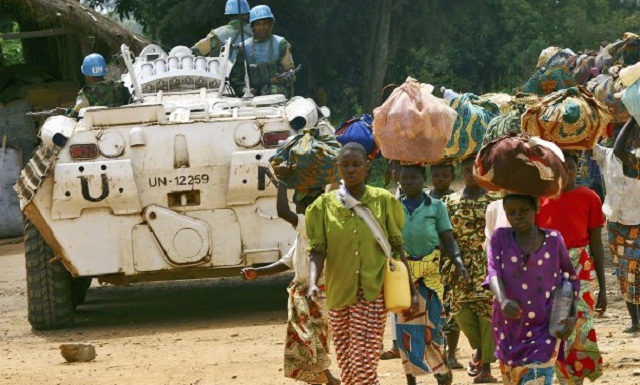
Geneva, Switzerland | AFP | Around 16,000 people have fled into the Democratic Republic of Congo’s neighbour after inter-communal clashes erupted last month in the southwest of the country, the UN said on Friday.
Violence in Yumbi, in the DRC province of Mai-Ndombe, prompted an exodus to the neighbouring Republic of Congo, also known as Congo-Brazzaville, the UN’s refugee agency said.
UNHCR spokesman Andrej Mahecic stressed that the violence stemmed from long-standing tensions between two communities in Yumbi.
It had nothing to do with last Sunday’s elections in the DRC nor a dispute over delays in the vote count, he said.
“An old rivalry between Banunus and Batende communities led to fresh inter-communal clashes,” Mahecic told reporters in Geneva.
“The reignited dispute is reported to have killed dozens, with around 150 injured arriving in Congo-Brazzaville,” he said.
“This is the largest influx of refugees from the DRC into Congo-Brazzaville in almost in a decade,” he said.
In 2009, some 130,000 people were forced to seek shelter there due to ethnic clashes in DRC’s former Equateur province.
The Republic of Congo currently hosts some 60,000 refugees, mainly from DRC, the Central African Republic and Rwanda.
Mahecic said the latest wave was mostly women and children from the Banunu tribe.
They were continuing to arrive in the districts of Makotipoko and Bouemba, where government authorities and UN agencies are providing medical treatment and other aid, he said.
“Those fleeing DRC talk of attacks that left homes burned and people killed,” he said, pointing to a humanitarian assessment mission to Yumbi which found more than 450 homes destroyed following clashes.
His comments came as the UN Security Council prepared to hold a closed-door meeting about Sunday’s elections in the DRC.
The marathon vote-counting process has sparked opposition fears that the result will be rigged to favour President Joseph Kabila’s preferred successor, Emmanuel Ramazani Shadary.
The communal violence in Yumbi, and insecurity and an ongoing Ebola epidemic in part of North Kivu on the other side of the country, prompted authorities to postpone the elections in those areas until March.
 The Independent Uganda: You get the Truth we Pay the Price
The Independent Uganda: You get the Truth we Pay the Price





